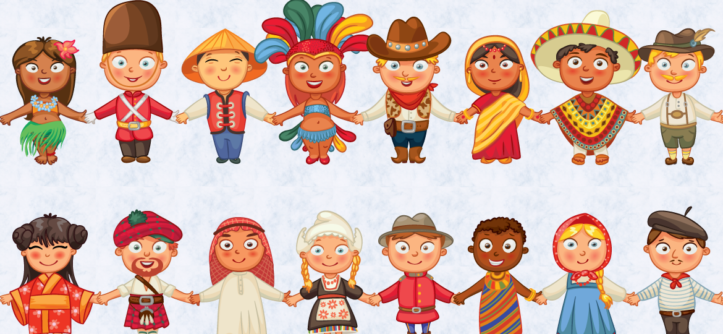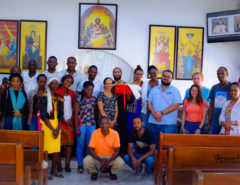Below is a summary of a talk given at the BOLD Evangelism Conference in July 2019 under the auspices of H.G. Bishop Youssef and in the presence of H.G. Bishop Basil and H.G. Bishop Gregory. I am so grateful for the leadership, discussions and experiences we had in this conference.
To understand fully this blog post, it is so important to listen to the talk. This blog post is a small summary but the talk itself has great points and examples that further the points.
The goal of the talk is simply to start a conversation and a discussion on how we can bring the Ancient Orthodox Faith to all nations. There are many successful Orthodox missions that have adapted to the culture of the nation because the culture is easier to see and understand. However, in the Western culture of places like America and Canada, the culture is not so readily apparent. However, there is a culture and tradition that requires a deeper understanding while never losing the Orthodox Faith and Tradition.
Introduction
There is neither Jew nor Greek, there is neither slave nor free, there is neither male nor female; for you are all one in Christ Jesus. Galatians 3:28
Culture can be celebrated as a way to learn about each other, not a way of dividing. We never want to make any group in the church feel rejected.
It is beautiful that you love your culture you have grown with, but it doesn’t mean the church should preserve only your culture.
The church is responsible for:
- Learning and Preserving the Faith
- Celebrating all Cultures
- Adapting to the Host Culture You Live In
The goal is to create a Christian Orthodox Culture and we should definitely understand the ways of the people of the land but not let the negative aspects of any culture overtake us. At the same time adapting to the host culture to win the people in that culture to the Orthodox Way.
Learning and Preserving the Orthodox Faith
To adapt to the culture never means to water down the Orthodox Faith to attract people. Our faith will attract people to Him.
Our Faith should protect us and our Youth from the negative aspects of culture that is harmful to us.
I find many debates about fighting about culture and language when we really never understood our Faith. Never even understand who Christ is!
Every one of us has to learn and preserve our Faith. The Orthodox first century faith.
Therefore, brethren, stand fast and hold the traditions which you were taught, whether by word or our epistle. 2 Thessalonians 2:15
To preserve the faith, it will need a generation that can stand fast and be steadfast. What we have is beautiful and don’t convince yourself that the new people who will come will never like it.
Maybe you need to like it first. You need to learn and enjoy and taste before we preserve.
There are a lot of people out there that think they know the faith and they are the defenders of the faith and make others around them feel bad. Some know the faith with their mind only and not their heart
If you know the faith don’t make others feel dumb or that they are not doing something right in the church. Let your words be seasoned with salt, grace (Colossians 4:6).
Take a hold of this beautiful faith and hand it down and around to all in the right way.
Celebrating all Cultures
After we learn and preserve our faith, we should celebrate differences in culture and personality.
Christ and His disciples were different but were One.
All members need to be served, but all members should serve all members. Where rich and poor can worship together. Where Zealot and Publican can be disciples together.
Christ was a carpenter and the disciples were fisherman, tax collectors, and from all walks of life. For example, Matthew was a publican (Tax Collector) who wanted to work with Roman Government and Simon was a Zealot who was against Roman rule. They both managed to be one of the twelve disciples working together, eating together, living together, worshipping together and accepting each other’s cultures.
Politics, Culture, Race, and separate type of groups have no place in dividing the Church Mission. Christ brought all together.
He ate with the sinner and visited the poor. He was with fisherman and tax collectors. He adored children.
We are responsible as a church of mission to bring all people, all races, all cultures from the community together and to search out how to serve them spiritually (for them to attain the Kingdom), and socially (for them to survive and be blessed on the earth).
Yes, we should be proud of where we are from. Proud Egyptian or Proud Ethiopian or Proud African or wherever you are from.
Again, the goal is to reach out to the community to pull them into the true Orthodox Faith. We are making a connection with the people.
Wherever you are from, you can apply this. We need to stop looking at the color of skin or different heritages as division but as multiplication. We can learn so much from each other.
I have definitely learned so much from the culture of the beautiful Zambian people. Also, with the commitment of the Eritrean, Ethiopian, Indian, and Egyptian Orthodox heritage and culture, which we have all praying together in our Orthodox Church in Lusaka.
Let us always keep our mindset on preserving the Faith. In addition, let us celebrate ALL cultures.
Adapting to the Host Culture You Live In
Part of our Orthodox Faith will not let the negative parts of the culture we enter to affect us. Yet, of necessity, we the missionary must make huge cultural adaptations.
This is not just a case of some flexibility; it’s much more than that. The missionary must become as a child and begin slowly learning the outward manifestations of the new culture, as well as what is behind the behaviors, beliefs, values, and worldviews of that culture.
Instead of judging everything by their own standard of what is “normal,” missionaries must revise and expand that standard in almost every area. Traditional ways people live—their foods, houses, clothing, travel modes, games and sports, singing and worship—are not intrinsically right or wrong.
We must come to know, understand, and ultimately learn to appreciate new and different ways of doing almost everything. Unfortunately, our own culture tends to get in our way at every turn. As a result, the first tendency is always to give negative attribution to everything that is different from our own ways. We tend to judge these differences as foolish, wrong, inefficient, evil, stupid, wasteful, backward, etc.
In order to take the gospel to the nations, we must learn to interact with others in a way that allows us to communicate the truth clearly.
We must understand our own culture, learn about the cultures we are entering, and articulate the gospel in an understandable way for people of those cultures.
Both sides usually reject each other’s cultures. And for immigrants this can put parents against children. Parents have no clue what is going on in this new culture and reject it or don’t realize what their kid is facing.
Conclusion
Once again, we know when St. Mark brought our Faith to Egypt that he preserved the Faith and adapted to the culture of the land.
Some of our hymns and musical instruments that we use today in the church comes from the Pharaonic pagan culture. St. Mark in his evangelistic spirit did not change the culture to his culture but adapted to the good parts of their culture to give the Ancient Egyptians the true Orthodox Faith.
It doesn’t mean that we have become a pagan culture. Nor does it mean we will become a pagan culture if we change hymn tones or languages to the culture of the land.
Let us keep our focus on the prize and our focus on these 3 things in the church.
Preserving the beautiful Orthodox Faith, celebrating all cultures, and adapting to the good parts of the culture that can help us connect with the people around us and bring them to Him.
Mission Assignment: Listen to the talk. Start the discussions with your leadership on the culture of the area you live in and how you can become students of the culture to adapt to the culture but preserve the Faith.
Tags: adapt, BOLDConference, dialogue, Evangelism, Faith, host culture, Mission, OneChurch, preserve


Dear Fr Abrahm thank you a lot for this very good message. As always your message is very practical and addressing our challanges here in Ethiopia.
Thank you Zenebe. May God bless you in your mission in Ethiopia!